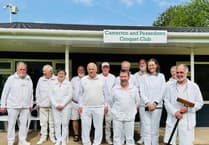The merger between the Southwest Peninsula League and the Western League was given
approval by the Football Association’s League’s Committee last month.
John Pool the Chairman of the Toolstation Western League and Phil Hiscox, the Secretary of the Southwest Peninsular League, joined Ian Nockolds on the Toolstation Western League
Podcast to discuss what this latest announcement means for Project South West.
The full interview is being serialised in The Journal and in this fifth episode, Phil responds to the criticism that the proposed merger is going to over-promote teams into the new Step Five, division as well as potentially reducing the number of clubs at Step Six.
PH: I think let’s take Step Five first; I don’t consider two 18s to be a problem at Step Five. And that’s because there’ll be so many commitments to other cup competitions it reduces the amount of midweek travel, and let’s be perfectly blunt, clubs throughout football - this isn’t an issue for the Southwest - players and match officials, and groundsman don’t play on the ploughed fields that they used to do when we played 40-odd league games of the season. And perhaps probably they shouldn’t. I mean, some of us of an older generation look at it and say, ‘looks bloody playable to me.’ But people don’t these days, they expect a better quality of pitch. So, I’m very comfortable with 18s at Step Five, as to whether it will water down the standard; let’s be perfectly blunt here - it’s a gamble, and everything you do is a gamble, to stay still is the easy thing to do. To carry on doing things the way you’ve always done them is the easy thing to do. And the one thing I would commend the people involved, on both sides of this proposal, is their willingness to put things that they used to do on the line for the betterment of football by doing something different. If that’s a gamble, yes, then so be it and some clubs may be over promoted, some clubs it will be absolutely ideal for them. It will be the difference between, dare we say it, choosing to play at Step Six or at Step Five, because you’ve created something that suits them so well. For others, it will be something they will strive to achieve perhaps in order to reach a timeline that’s dictated. The one thing I would say on that gamble, though, is if it was a gamble 12 months ago, this restructure, when we talked about travel times, the way the cost of living is going, the way the cost of fuel is going, energy bills and things, it’s less of a gamble now. There are actually more reasons now to reduce travelling than there was a year ago. So, on that side of the coin, I’m quite happy that the percentage of whether this is a good idea is actually a higher percentage than it was when we first sat down. Now at Step Six, myself and John, we both shared a concern that 16 is very low, and it’s not our plan, if possible, to have 6 teams. We would like to have 8 teams. What we have to accept, though, is that the FA are, quite rightly in their regard, making sure that they protect the regional feeder leagues below in that we don’t over-promote to the detriment of the sustainability of those leagues. So, 16 to 18s are possible. What we have said there, though, is if there are going to be 16s, particularly as at Step Six you still have to have floodlights, then another competition ... Now, the format of that hasn’t been discussed. We called it a cup competition, that could be a round robin, it could be two-legged, it could be straight knockout. It’s going to have to be developed to encourage extra fixtures and probably extra midweek fixtures. And I’m quite excited actually there that at Step Six, putting in some extra local derbies as cup commitments could be a good boost for those clubs’ finances, as well. And I think that’s one of the things I have learned from what’s happened over the last year or two is the issue of travelling reduces the number of good payday local derbies for all clubs. That’s true in Bristol, where you know, every time you’re playing a team from Cornwall it’s a time where before you were playing somebody more local to you and just as true Cornwall, that if you’re playing a team from Bristol, you’re not playing a team from elsewhere in Devon and Cornwall. So, local derbies are very important, not just on the pitch for local honours, they’re also very important to club chairmen and club treasurers.
Next week John Pool concludes this series of articles by explaining where the proposal to merge the Leagues goes from here. The full interview can be heard on episode 4 of the Toolstation Western League Podcast, available to listen at http://toolstationleague.com/podcasts/





Comments
This article has no comments yet. Be the first to leave a comment.